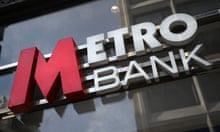Metro Bank is cutting 1,000 jobs and ending its trademark seven-day branch model, after nearly tripling the size of its cost-cutting plan after its autumn rescue deal.
The lender said on Wednesday that it had expanded an original £30m cost savings plan, first announced in October, to £50m – after axing about 200 more staff than it had initially aimed for – and now planned to slash a further £30m in costs by the end of the year, bringing its total savings to £80m.
Its chief executive, Daniel Frumkin, said the bank was considering further job cuts, having already trimmed £44m in costs by shrinking its 4,000-strong workforce by 22%.
The bank will also scale back its seven-days-a-week opening model across its 76 branches from April, including closing on Sundays, reducing daily hours in some branches and moving some to five-days-a-week opening.
“Based off of the modelling we’ve done, we’ll still be open more hours than any of our competitors on the high street. And we’ve aligned it with actual customer activity,” Frumkin said.
Reduced hours have helped drive Metro’s job cuts, which have most heavily affected staff in branches and its risk, finance and human resources teams. Frumkin emphasised that Metro had also shrunk the size of its board and executive team along the way.
“This was a top-down exercise and nobody was exempt from needing to find savings,” he said.
The expanded overhaul comes months after Metro, which was co-founded by the US billionaire Vernon Hill and became the UK’s first new high street lender in 150 years when it launched in 2010, clinched a £925m rescue package in October that involved cornerstone investment from the Colombian billionaire Jaime Gilinski Bacal. The Latin American banking tycoon took a 53% stake in Metro as a result of the deal.
It avoided a potential breakup or takeover of the UK high street lender, which was thrown into turmoil after failing to convince regulators to loosen its capital rules and allow it to hold less money against its mortgage risks. The decision left Metro with a shortfall on its balance sheet, and market panic that resulted in the emergency deal.
Benjamin Toms, an analyst at RBC Capital Markets, said: “We believe there is a long road ahead and execution will be key, but the refinancing package has bought management time to reshape the bank.”
The cost-cutting announcements came as Metro reported a pre-tax profit of £30.5m for the whole of 2023. That is up from a £70.7m loss a year earlier and marks its first statutory pre-tax profit since 2018.
Metro has so far refused to disclose any figures around the amount of money that worried customers withdrew during the autumn crisis. However, panic over outflows prompted bosses to launch a generous campaign to attract fresh cash. That involved offering instant-access savings rates as high as 5.22%, and a one-year fixed term savings account with a rate of 5.91%.
The campaign has proved to be too successful, however, resulting in unexpected costs for Metro, which is now aiming to reduce its deposit base in 2024.
Metro bosses admitted the lender was heading into a “transitional year”, and was braced for further economic headwinds and competition between lenders that would probably weigh on revenue and profitability.
Ed Firth, an analyst at KBW, said: “It remains unclear to us whether the franchise will be profitable in full-year 2024.”
However, Metro will charge ahead with a strategy to “double down” on lending to businesses, including small- and medium-sized enterprises (SME), where it sees more opportunity for growth. Metro approved 140% more business loans in the first 10 weeks of the year than it had for the entirety of 2023, which Frumkin said illustrated how effectively it could adapt to shifting priorities.
The bank will continue to open more branches, including 11 in the north of England, with particular attention to locations it considers to be “SME hotspots”.
“I’m confident we are now a stronger business with stronger foundations,” Frumkin said. “The path ahead is clear for us to become a structurally profitable business whilst remaining the number one community bank.”
Metro Bank shares rose as much 0.6% after its announcement, before losing ground to trade 4.7% down by mid afternoon.









